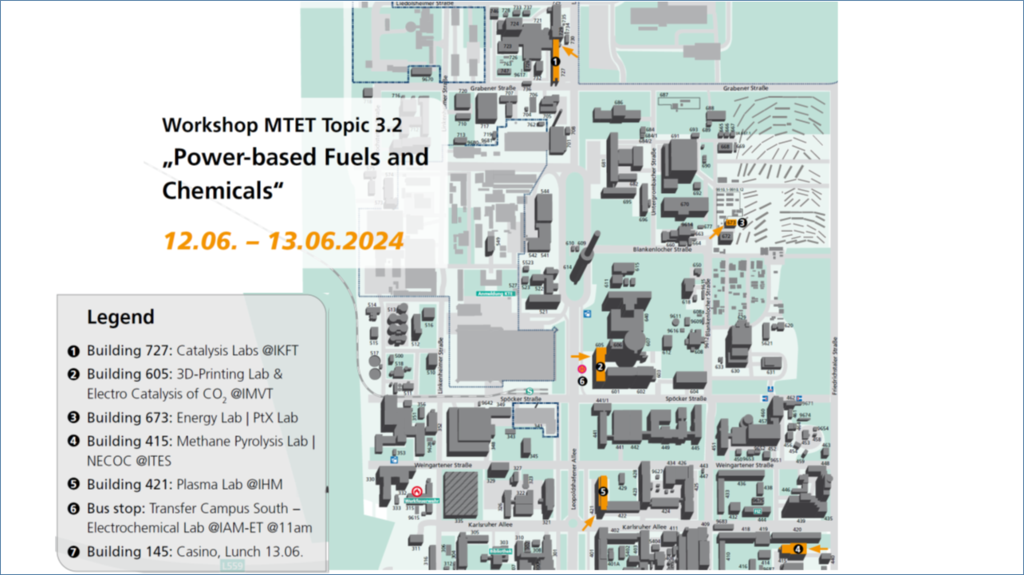MTET Topic 3.2 Workshop "Power-based Fuels and Chemicals"
↵
- Please fill in the following form for workshop registration.
- Draft Agenda (as of 04 June 2024)
- Please register until 30.04.2024 (binding).
- The accommodation and travel costs have to be paid by the participants.
- Please book for your own hotel.
- The workshop will take place at the Auditorium of FTU (Fortbildungszentrum für Technik und Umwelt, Hermann-von-Helmholtz-Platz 1, 76344 Eggenstein-Leopoldshafen) You do not have to enter the KIT Campus North to access the FTU.
- The dinner (12. June 2024) will take place at Aurum Karlsruhe (Alter Schlachthof 45, 76131 Karlsruhe). We organize bus transfer to the Aurum (or you use your own car).
- A map for the lab tour on 13.06. is here
- As part of the lab tour, you can visit the Electrochemical Lab @IAM-ET at Campus South. There will be a bus transfer from Campus North at 11 am. If you want to drive your own car to the IAM-ET at Campus South, you can find information on how to get there here.

Please use our map to find your way to the lab tour stations. The transfer to the Electrochemical Lab @IAM-ET will take place at 11 am. A bus will take you to the Campus South in Karlsruhe.
Open the map
At KIT-IKFT, catalysis labs will be visited with a focus on catalyst synthesis, shaping and testing. Exemplary lab plants will be presented, especially for the synthesis of methanol or dimethyl ether and their conversion to formaldehyde, oxymethylene ethers and olefins. Strategies for the production of hydrocarbon fuels by Fischer-Tropsch synthesis and olefin oligomerization will also be illustrated. Another focus is on strategies for hydrogen storage, e.g. by LOHC technologies, and the role of hydrogen in COx processing.

Liquid Metal based Thermochemistry and Heat Storage
At the Karlsruhe Liquid Metal Laboratory KALLA at ITES, we specialize in research on fundamentals and application of liquid metals (LM) as heat transfer media. Over the years, a wide field of expertise and applications, from operating large liquid metal loops for pilot scale fast nuclear reactor cooling through thermochemical applications all the way through to innovative thermal storage at high temperatures beyond 500 °C has evolved. During the tour we will show a liquid metal bubble column reactor for methane pyrolysis and a demo scale liquid metal based heat storage, along with providing a glimps on our experimental infrastructure.

In the KIT plasma lab, the joint activities of IHM and IMVT for the activation of CO2 and other abundant molecules with the aid of atmospheric plasmas, sustained with novel pulsed microwave source, will be presented.
This includes the design and development of new high-power plasma sources, novel reactor concepts and the use of plasma diagnostics. Time resolved spectrometry is performed with a high-resolution OES spectrometer, a Vertex 80 FTIR spectrometer and a TimeGate PicoRAMAN spectrometer with ns time resolution. Similar time resolution is available for fast imaging of the plasma flame. In addition, experiments are supported by an in-situ gas analyzer and a homemade microwave interferometer at frequencies up to 330 GHz is used for plasma electron density measurements.
For demonstration scales, a container-based plasma process line for the dissociation of captured CO2, supported by the Helmholtz large investment project eXPlore, is under construction and will be exhibited.

The Energy Lab is a large Helmholtz research infrastructure with its major components being realized at KIT. Here, the research can be subdivided into three main areas: the Smart Energy System Simulation and Control Center (SEnSSiCC) which focuses on power hardware, the power grid incl. grid simulation, consumers/prosumers and batteries, (2) the carbon cycle lab (CCLab) focusing on the recycling of C-containing materials of both, synthetic and biological origin to synthetic value products and (3) the PtX lab, a plant network aiming to investigate and demonstrate the coupling of the different components of PtX process chains including different electrolyses and synthesis units (FT-based fuels, Methane, MeOH) which will be shown and explained during the “PtX lab tour”.
